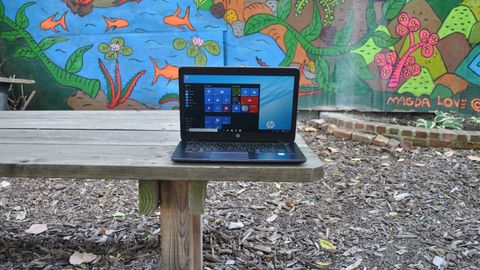Why you can trust TechRadar
Don't let the advanced processor and graphics card fool you, some laptops lag behind competitors with exactly the same chipset. That's why it's always important to read reviews that feature benchmark scores to determine whether or not a laptop's particular chip functions well in concert with all of the laptop's other hardware.
Benchmarks
Here's how the HP ZBook 14 G2 performed in our suite of benchmark tests:
- 3DMark: Cloud Gate: 5,455; Sky Diver: 2,988; Fire Strike: 961
- Cinebench CPU: 279 points; Graphics: 42 fps,
- PCMark 8 (Home Test): 2,782
- PCMark 8 Battery Life: 3 hours and 23 minutes
In the Cinebench graphics test, the ZBook 14 G2 managed a frame rate of 42 frames per second (fps), which is exactly the same as the Dell's 42 fps, but much worse than the Lenovo's 60 fps. For the CineBench CPU test, which measures a processor's multi-core performance via a 3D image rendering task, the ZBook scored 279 points, which is the same as the Lenovo, and dramatically lower than the M3800, which scored 501 points.
The ZBook scored 961 points in 3DMark's Fire Strike test, which measures graphics rendering. The Lenovo scored 1,426 points. The ZBook also lost in a head-to-head against the Lenovo on the 3D Mark Sky Diver test by a wide margin (2,988 to 4,530). To be fair, the ZBook scored a couple of hundred points higher on the 3D Mark Cloud Gate test, besting the Lenovo's 5,246.
It also took home the prize on PCMark's Home test, which measures your laptop's ability to handle common tasks like web browsing, writing, gaming, photo editing, and video chat, among other tasks. The ZBook scored 2,782 points, a whopping 600 points higher than the Lenovo.
The Lenovo W550's battery lasts 8 hours and 55 minutes during the PCMark 8 Battery Life test, and our reviewer was able to run the machine for 11 hours without over-exerting it. Unfortunately, the ZBook doesn't reach these marks. It scored a 3 hour and 23 minute rating on the PCMark Battery Life Test, and I was able to run the machine for about 7 hours and 15 minutes playing Guardians of the Galaxy on a loop at 50% screen brightness and 50% volume.
When I attempted to tax the machine with more than a dozen spreadsheets open and YouTube running in the background, I witnessed no lag in performance and was able to switch between tasks instantly. However, the laptop only lasted about 6 hours and 45 minutes, which is still pretty good for a mobile workstation.
A couple of major flaws
When I received the HP ZBook 14 G2, I was psyched to see that Windows 10 had been already installed. This would have been my first non-preview version of Windows 10, and it would have been on a powerhouse workstation packing a Core i7 processor.
Unfortunately, because the ZBook comes standard without a touchscreen, I wasn't able to take full advantage of the new operating system, which is a huge bummer. Yes, you can upgrade to a touchscreen, but you're already paying so much for this device as is. Keep this in mind if you're interested in buying a mobile workstation, but you need Windows 10.
The price is also a major concern. The aforementioned Lenovo and MacBook Pro are about $600 (£386, AU$845) cheaper than the ZBook. The Dell M3800 is about $150 (£97, AU$211) cheaper. In the case of the Dell and the Lenovo, you'd be sacrificing performance while still paying more.
Although we haven't benchmarked the MacBook, I'd expect performance to be in-line if slightly worse than the ZBook 14, given the Apple device's less powerful Core i5 chipset. But you'd get a lot more style and portability with the Mac.

